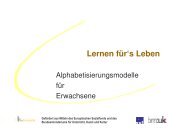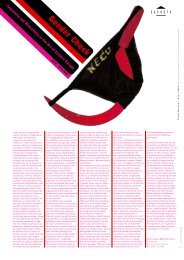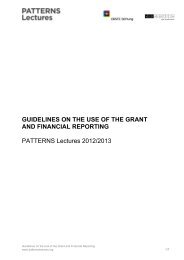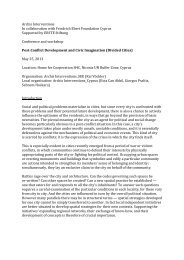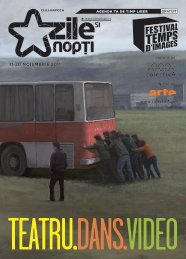Ewa Toniak – art historian, critic, curator. She is ... - ERSTE Stiftung
Ewa Toniak – art historian, critic, curator. She is ... - ERSTE Stiftung
Ewa Toniak – art historian, critic, curator. She is ... - ERSTE Stiftung
You also want an ePaper? Increase the reach of your titles
YUMPU automatically turns print PDFs into web optimized ePapers that Google loves.
<strong>Ewa</strong> <strong>Toniak</strong> <strong>–</strong> <strong>art</strong> <strong>h<strong>is</strong>torian</strong>, <strong>critic</strong>, <strong>curator</strong>. <strong>She</strong> <strong>is</strong> interested in contemporary <strong>art</strong> in the<br />
femin<strong>is</strong>t perspective, the media image of women <strong>art</strong><strong>is</strong>ts, ‘blank spots’ in Pol<strong>is</strong>h h<strong>is</strong>tory and<br />
women’s presence in h<strong>is</strong>tory. Between 2003-2005, she taught in the Gender Studies course at<br />
the Institute of Applied Social Sciences, Warsaw University,. Author of numerous <strong>critic</strong>al<br />
texts. In 2008, she publ<strong>is</strong>hed Olbrzymki: kobiety i socrealizm [The Giants: Women and<br />
Social<strong>is</strong>t Real<strong>is</strong>m].<br />
<strong>Ewa</strong> Franus <strong>–</strong> <strong>art</strong> <strong>h<strong>is</strong>torian</strong> and <strong>critic</strong>, author of texts on femin<strong>is</strong>t <strong>art</strong> h<strong>is</strong>tory and women’s <strong>art</strong>.<br />
<strong>She</strong> has publ<strong>is</strong>hed in Magazyn Sztuki, Nowy Nurt and D’Art. Translator into Pol<strong>is</strong>h of Lynda<br />
Nead’s The Female Nude and fragments of Donna Haraway’s A Cyborg Manifesto. <strong>She</strong><br />
lectures on Eastern European <strong>art</strong> at the Kunsth<strong>is</strong>tor<strong>is</strong>ch Centrum Amsterdam.<br />
Katarzyna Murawska-Muthenius, PhD <strong>–</strong> deputy director of the National Museum in<br />
Warsaw, <strong>art</strong> <strong>h<strong>is</strong>torian</strong>, interested in, among other <strong>is</strong>sues, the relationships between<br />
contemporary <strong>art</strong> and ideology. Lecturer at Birkbeck College, University of London. Her<br />
publications, exhibitions and conferences promoting Pol<strong>is</strong>h <strong>art</strong> in Britain include, among<br />
others, Borders in Art: Rev<strong>is</strong>iting Kunstgeographie (2000), An Impossible Journey: The Art<br />
and Theatre of Tadeusz Kantor (Norwich, 2009), or Rebels, M<strong>art</strong>yrs and the Others:<br />
Rethinking Pol<strong>is</strong>h Modern<strong>is</strong>m ( London, 2009).<br />
Dominika Cieślikowska <strong>–</strong> transcultural psycholog<strong>is</strong>t, she <strong>is</strong> interested in, among other things,<br />
cultural identity <strong>is</strong>sues as well as gender difference and gender relations. <strong>She</strong> works in the<br />
Dep<strong>art</strong>ment of Cross-Cultural Psychology at the Warsaw School of Social Sciences and<br />
Humanities’ Institute of Social Psychology. <strong>She</strong> collaborates on multiculturality <strong>is</strong>sues with a<br />
number of governmental and non-governmental institutions in Poland and abroad.<br />
Izabela Kowalczyk, PhD <strong>–</strong> <strong>art</strong> <strong>h<strong>is</strong>torian</strong>, <strong>critic</strong>, <strong>curator</strong> and commentator. <strong>She</strong> lectures at the<br />
School of Humanities and Journal<strong>is</strong>m in Poznań. Co-founder and chief editor of the online<br />
periodical Artmix devoted to v<strong>is</strong>ual culture and the plastic <strong>art</strong>s (in 2006 merged with Obieg).<br />
Author of two books, Niebezpieczne związki sztuki z ciałem [Dangerous Lia<strong>is</strong>ons Between Art<br />
and the Body] (2002), and Ciało i władza. Polska sztuka krytyczna lat 90. [The Body and<br />
Power. Pol<strong>is</strong>h Critical Art of the 90s] (2002). With <strong>Ewa</strong> Ziarkiewicz, editor of collections of<br />
texts: Kobiety w kulturze popularnej [Women in Popular Culture] (2002), W poszukiwaniu<br />
małej dziewczynki [In Search of the Little Girl] (2003), and Kobiety, feminizm i media<br />
[Women, Femin<strong>is</strong>m, and the Media] (2005).<br />
Paweł Leszkowicz, PhD <strong>–</strong> <strong>art</strong> <strong>h<strong>is</strong>torian</strong>, <strong>critic</strong> and <strong>curator</strong> interested in contemporary <strong>art</strong> and<br />
v<strong>is</strong>ual culture as well as studies of sexuality. He lectures at the Adam Mickiewicz University<br />
and the Academy of Fine Arts in Poznań. Author of the book Helen Chadwick. Ikonografia<br />
podmiotowości [Helen Chadwick: An Iconography of Subjectivity] (2001), devoted to a<br />
psychoanalytical interpretation of contemporary <strong>art</strong>; co-author of Miłość i demokracja.<br />
Rozważania o kwestia homoseksualnej w Polsce [Love and Democracy. Reflections on the<br />
Homosexual Question in Poland] (2005). Curator of the exhibition Art Homo Erotica at the<br />
National Museum in Warsaw, opening in June 2010.<br />
Prof Magdalena Środa <strong>–</strong> ethic<strong>is</strong>t, philosopher, commentator, femin<strong>is</strong>t. <strong>She</strong> works in the<br />
Dep<strong>art</strong>ment of Ethics of the Warsaw University’s Institute of Philosophy. <strong>She</strong> <strong>is</strong> interested in<br />
the h<strong>is</strong>tory of ethical ideas, applied ethics, political philosophy and women’s <strong>is</strong>sues (she<br />
lectures at Gender Studies, Warsaw University). Author of numerous publications on political<br />
and moral philosophy and books such as Idea godności w h<strong>is</strong>torii i etyce [The Idea of Dignity
in H<strong>is</strong>tory and Ethics] (1993), Idee, normy i w<strong>art</strong>ości moralne [Ideas, Norms, and Moral<br />
Values] (1994), H<strong>is</strong>toria idei etycznych: starożytność i średniowiecze [A H<strong>is</strong>tory of Ethical<br />
Ideas: Antiquity and the Middle Ages] (1995), H<strong>is</strong>toria idei etycznych: nowożytność i czasy<br />
współczesne [A H<strong>is</strong>tory of Ethical Ideas: Modernity and Contemporary Times] (1998),<br />
Indywidualizm i jego krytycy. Współczesne spory między liberałami, komunitarianami i<br />
femin<strong>is</strong>tkami na temat podmiotu, wspólnoty i płci [Individual<strong>is</strong>m and Its Critics:<br />
Contemporary D<strong>is</strong>putes Between Liberals, Communitarians and Femin<strong>is</strong>ts about the Subject,<br />
Community, and Gender] (2003), Kobiety i władza [Women and Power] (2009). <strong>She</strong> was the<br />
Government Representative for Equal Status of Women and Men in the Marek Belka cabinet<br />
(2004-2005). <strong>She</strong> was also member of the European Monitoring Centre for Rac<strong>is</strong>m and<br />
Xenophobia in Vienna.<br />
Paulina Kwiatkowska <strong>–</strong> PhD in the Dep<strong>art</strong>ment of Film and Audiov<strong>is</strong>uality at the Warsaw<br />
University’s Institute of Pol<strong>is</strong>h Culture. <strong>She</strong> <strong>is</strong> interested in film aesthetics and theory, body<br />
anthropology and h<strong>is</strong>tory of audiov<strong>is</strong>ual culture. Co-founder and chief editor of the proculture<br />
project Orgia Myśli. <strong>She</strong> writes for periodicals such as Kw<strong>art</strong>alnik Filmowy, Nowe<br />
Książki or Dialog.<br />
B<strong>art</strong>osz Żurawicki <strong>–</strong> film <strong>critic</strong>, writer, column<strong>is</strong>t. He holds a degree in cultural studies with<br />
a special<strong>is</strong>ation in film and theatre from the Adam Mickiewicz University’s Faculty of Social<br />
Sciences. Author of the novel Trzech panów w łóżku nie licząc kota. Romans pasywny [Three<br />
Men in a Bed (To Say Nothing of the Cat). A Passive Love Story] (2005) and three dramas<br />
collected into the volume Erotica alla polacca (2006). Co-author of books such as Autorzy<br />
kina polskiego [Pol<strong>is</strong>h Cinema Authors] (2004) or Homofobia po polsku [Homophobia, Pol<strong>is</strong>h<br />
Style] (2004). He has publ<strong>is</strong>hed in periodicals such as Film, Przekrój, Tygodnik Powszechny,<br />
Dialog, Aktiv<strong>is</strong>t, Ha!<strong>art</strong>. Laureate of the 1996 Krzysztof Mętrak Prize for young film <strong>critic</strong>s.<br />
Bożena Umińska-Keff <strong>–</strong> poet, writer, essay<strong>is</strong>t, commentator. <strong>She</strong> lectures in Gender Studies<br />
at the Warsaw University. Works at the Jew<strong>is</strong>h H<strong>is</strong>torical Institute. Author of Razem Osobno<br />
[Together Separately] (1986), Sen o znaczeniu snów [A Dream about the Meaning of Dreams]<br />
(1994), Nie jest gotowy [He Is Not Ready] (2000), Postać z cieniem. Portrety Żydówek w<br />
polskiej literaturze [Figure with a Shadow. Portraits of Jew<strong>is</strong>h Women in Pol<strong>is</strong>h Literature]<br />
(2001), nominated for the Nike literary prize; Barykady. Kroniki obsesyjne [Barricades.<br />
Obsessive Chronicles] (2006), Utwór o matce i ojczyźnie [Opus about Mother and Fatherland]<br />
(2008), nominated for the Nike literary prize. <strong>She</strong> publ<strong>is</strong>hed in periodicals such as Przekrój,<br />
Res Publica Nowa, Zadra, Midrasz or Przegląd. One of the first scholars in Poland to study<br />
the linkages between national<strong>is</strong>m and cultural gender constructions. In her journal<strong>is</strong>m, she<br />
deals with the d<strong>is</strong>criminating aspects of Pol<strong>is</strong>h culture <strong>–</strong> m<strong>is</strong>ogyny, homophobia, anti-<br />
Semit<strong>is</strong>m.<br />
Małgorzata Radkiewicz <strong>–</strong> film scholar, ass<strong>is</strong>tant professor in the Chair of the Audiov<strong>is</strong>ual<br />
Media of the Jagiellonian University in Cracow. <strong>She</strong> ins interested in gender and femin<strong>is</strong>t<br />
<strong>is</strong>sues, most p<strong>art</strong>icularly the cultural identity of gender in popular culture: the mass media and<br />
contemporary, especially Pol<strong>is</strong>h, cinema, after 1989. Founder and coordinator of the<br />
Postgraduate Gender Studies Course at the Jagiellonian University’s Institute of Audiov<strong>is</strong>ual<br />
Arts. Author of the monograph W poszukiwaniu sposobu ekspresji. O filmach Jane Campion<br />
i Sally Potter [Searching for a Means of Expression. On the Films of Jane Campion and Sally<br />
Potter] (2001), editor and co-editor of several joint publications, e.g. Gender w human<strong>is</strong>tyce<br />
[Gender in the Humanities] (2001), Gender, kultura, społeczeństwo [Gender, Culture,<br />
Society] (2002), Gender w kulturze popularnej [Gender in Popular Culture] (2003), Gender <strong>–</strong>
konteksty [Gender - Contexts] (2004), Gender: wizerunki kobiet i mężczyzn w kulturze<br />
[Gender: Images of Women and Men in Culture] (2005), as well as <strong>art</strong>icles in joint<br />
publications and scholarly periodicals. Reżyserki kina, tradycja i współczesność [Women<br />
Filmmakers: Tradition and the Present], a volume devoted to the most influential international<br />
women filmmakers, which she edited, was publ<strong>is</strong>hed in March 2005. In 2006, she publ<strong>is</strong>hed a<br />
volume devoted to the 90s debuts, „Młode wilki” polskiego kina [The ‘Young Wolves’ of<br />
Pol<strong>is</strong>h Cinema].<br />
Jacek Kochanowski, PhD <strong>–</strong> philosopher, commentator, associate professor in the Warsaw<br />
University’s Institute of the Sociology of Culture. He <strong>is</strong> interested in the sociology and<br />
philosophy of culture and in sketching h<strong>is</strong> own project of social queer theory. H<strong>is</strong> main<br />
inspiration <strong>is</strong> Michel Foucault. Author of Fantazmat zróżnicowany. Socjologiczne studium<br />
przemian tożsamości gejów [A Differentiated Phantasm: A Sociological Study of the Changes<br />
in Gay Identity] (2004), Spektakl i wiedza. Perspektywa społecznej teorii queer [The<br />
Spectacle and Knowledge: The Prospect of a Social Queer Theory] (2009), and numerous<br />
press publications.<br />
Jerzy Bereś <strong>–</strong> sculptor, performance <strong>art</strong><strong>is</strong>t, student of Xawery Dunikowski’s at the Cracow<br />
Academy of Fine Arts (graduated 1956). From 1966 member of the Cracow Group. In 1968,<br />
showed h<strong>is</strong> first <strong>art</strong><strong>is</strong>tic action, Prophecy I, at Warsaw’s Galeria Foksal. It was the beginning<br />
of a series of happenings, commenting on political, religious, <strong>art</strong><strong>is</strong>tic and philosophical <strong>is</strong>sues,<br />
in which the <strong>art</strong><strong>is</strong>t often employed h<strong>is</strong> own body. Since the 1970s, he has carried out<br />
numerous actions/manifestations (series like V<strong>is</strong>ions, Altars, Masses, Prophecies) in which<br />
the <strong>art</strong><strong>is</strong>t’s body plays a prominent p<strong>art</strong>, as well as creating large-scale wooden constructions.<br />
H<strong>is</strong> objects employ simple forms and materials <strong>–</strong> wood, field stones, hemp rope, burlap,<br />
leather thong. Bereś’s unique style has gained him recognition in Poland and abroad. He has<br />
had some 200 solo exhibitions and performances. He has p<strong>art</strong>icipated in numerous group<br />
shows presenting Pol<strong>is</strong>h <strong>art</strong> abroad (including representing Poland at the 9th Sao Paulo<br />
Biennale 1967/69). Husband of the sculptor Maria Pinińska-Bereś.<br />
Bettina Bereś <strong>–</strong> painter, holder of a degree in <strong>art</strong> h<strong>is</strong>tory from the Jagiellonian University<br />
(graduated 1981). Between 1985-89, she organ<strong>is</strong>ed and ran the Zderzak gallery in Cracow<br />
(with Maria Tarabuła). Since 1995, member of the Otw<strong>art</strong>a Pracownia association and gallery.<br />
<strong>She</strong> has p<strong>art</strong>icipated in numerous solo and group shows (e.g. Painting of the Year 2002: Top<br />
100 at Galeria Królikarnia in Warsaw). Daughter of Jerzy Bereś and Maria Pinińska-Bereś.<br />
Anna Taszycka, PhD <strong>–</strong> film scholar, commentator, she <strong>is</strong> also interested in contemporary <strong>art</strong><br />
and audiov<strong>is</strong>ual communication. <strong>She</strong> lectures in Gender Studies at the Warsaw University and<br />
in the Jagiellonian University’s Faculty of Management and Social Communication.<br />
Sylwia Chutnik <strong>–</strong> culture scholar, social activ<strong>is</strong>t, writer, laureate of the Paszport Polityki<br />
award (2008). Graduate of Gender Studies. Head of the MaMa foundation which focuses on<br />
mothers’ rights <strong>is</strong>sues.<br />
<strong>Ewa</strong> Majewska, PhD <strong>–</strong> philosopher, femin<strong>is</strong>t activ<strong>is</strong>t, she lectures in Gender Studies at the<br />
Warsaw University.<br />
Agnieszka Graff, PhD <strong>–</strong> writer, translator, commentator, member of the femin<strong>is</strong>t movement,<br />
she lectures in the Warsaw University’s American Studies Center and in Gender Studies.
Prof Paweł Dybel <strong>–</strong> philosopher, psychoanalys<strong>is</strong> theoretician, literature scholar, he works in<br />
the Pol<strong>is</strong>h Academy of Sciences’ Institute of Philosophy and Sociology and at the Warsaw<br />
University’s Institute of Applied Social Sciences. Translator of, among other authors, Fichte,<br />
Freud and Žižek.<br />
Małgorzata Furmanik-Kowalska <strong>–</strong> doctoral student in the Faculty of Fine Arts at the<br />
Mikołaj Kopernik University in Toruń, lecturer in Gender Studies at the Warsaw University.<br />
Samuel Nowak <strong>–</strong> doctoral student in Jagiellonian University’s Institute of Audiov<strong>is</strong>ual Arts.<br />
He has studied in Universiteit Antwerpen, Belgium, and King’s College, London. He <strong>is</strong><br />
interested in media theory in the formulation of cultural studies.<br />
<strong>Ewa</strong> Małgorzata Tatar <strong>–</strong> <strong>curator</strong>, <strong>art</strong> <strong>critic</strong>. Doctoral student in the Jagiellonian University’s<br />
Institute of Art H<strong>is</strong>tory. <strong>She</strong> <strong>is</strong> interested in, among other things, <strong>art</strong> in the context of gender<br />
in the anthropological and social formulation. <strong>She</strong> has studied in the Masaryk University,<br />
Brno, and the Adam Mickiewicz University, Poznań.<br />
Dominik Kuryłek <strong>–</strong> <strong>art</strong> <strong>critic</strong>, <strong>curator</strong>, <strong>curator</strong> at the National Museum in Cracow, doctoral<br />
student in the Jagiellonian University’s Institute of Art H<strong>is</strong>tory.<br />
Agata Adamiecka-Sitek, PhD <strong>–</strong> graduate of cultural studies at the Silesian University. <strong>She</strong><br />
works at Instytut Teatralny im. Zbigniewa Raszewskiego, where she <strong>is</strong> responsible for the<br />
project Inna Scena [The Other Stage], which aims to include cultural gender identity and<br />
sexual identity <strong>is</strong>sues, seen through the lens of gender studies and queer theory, in studies of<br />
the h<strong>is</strong>tory and present of Pol<strong>is</strong>h theatre. Editor of the publications Inna Scena. Ciało, płeć,<br />
pożądanie. Tożsamość seksualna i tożsamość płci w polskim dramacie i teatrze [The Other<br />
Stage. The Body, Gender, Desire. Sexual Identity and Gender Identity in Pol<strong>is</strong>h Drama and<br />
Theatre] and Inna Scena. Kobiety w h<strong>is</strong>torii i współczesności teatru polskiego [The Other<br />
Stage. Women in the H<strong>is</strong>tory and Present of Pol<strong>is</strong>h Theatre]. Fellow of the Kosciuszko<br />
Foundation. Since 2002, head of the theatre section of the qu<strong>art</strong>erly Kw<strong>art</strong>alnik Kulturalny<br />
Opcje.<br />
Prof Maria Poprzęcka <strong>–</strong> professor in the Warsaw University’s Institute of Art H<strong>is</strong>tory, head<br />
of the Postgraduate Museum Studies course at the Warsaw University’s Faculty of H<strong>is</strong>tory.<br />
President of the Association of Art H<strong>is</strong>torians. Her main interests include <strong>art</strong>, theory and <strong>art</strong><br />
<strong>critic</strong><strong>is</strong>m from the 19th century to the present, and the methodology of <strong>art</strong> studies. <strong>She</strong> has<br />
recently publ<strong>is</strong>hed Inne obrazy [The Other Pictures], a book devoted to those elements in our<br />
perception of the world that over the centuries have been eliminated or ignored by cultural<br />
conventions.<br />
Marcin Teodorczyk <strong>–</strong> holder of a postgraduate degree in gender studies. Deputy president of<br />
the association Stowarzyszenie Otw<strong>art</strong>e Forum. Writes for the femin<strong>is</strong>t periodical Zadra.<br />
Editor of the online periodical uniGENDER and of Homiki.pl.



